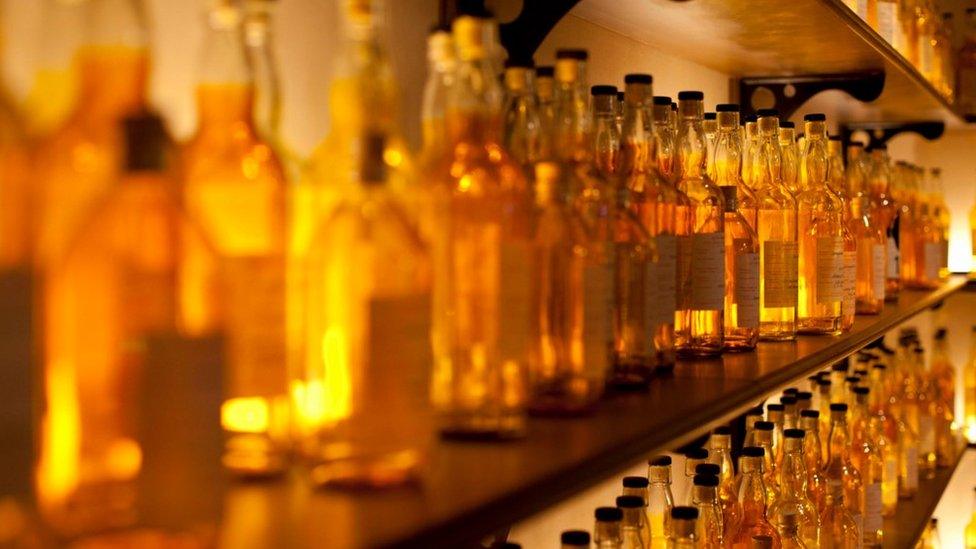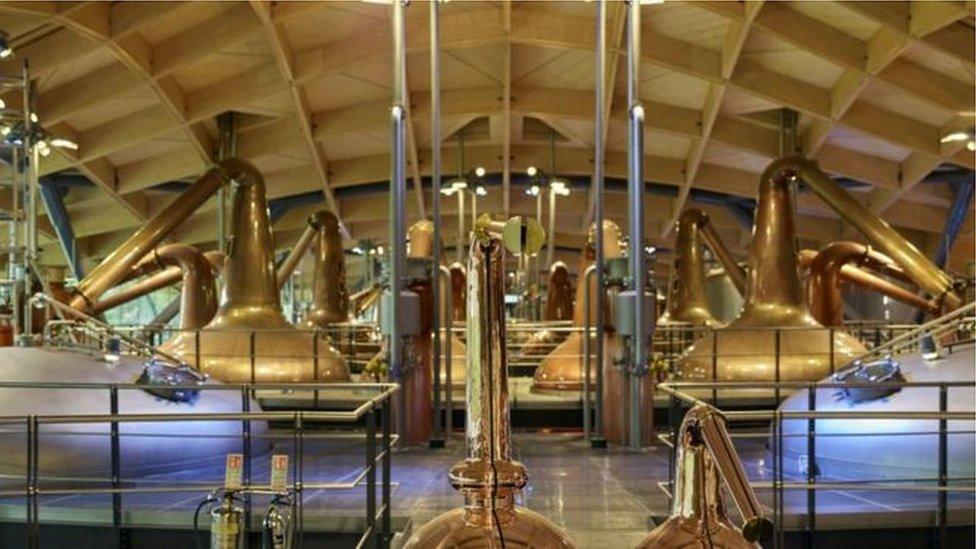Coronavirus: Whisky production to resume despite virus concerns
- Published

A number of whisky bottling plants which suspended work due to coronavirus are set to reopen.
The GMB Scotland union says facilities owned by Edrington, Inver House and North British have approached staff about coming back to work.
Other firms in the whisky and spirits industry, such as Diageo and Grants, have kept open plants with scaled-back operations.
Trade unions argue that all production should be halted due to Covid-19.
Edrington said a "controlled restart" with a significantly reduced number of staff would allow it to sustain the business and help safeguard employment.
While its bottling facilities in Glasgow and Speyside will re-open on Monday the company's distilleries will remain closed for at least three months.
The development comes as a survey of GMB Scotland members in the sector found just 18% believed that adequate social distancing measures were being followed in their workplace.
'Anxious and scared'
Keir Greenaway, GMB Scotland organiser for the whisky and spirits sector, said some his members had also reported getting abuse from members of the public for going to work.
He said: "The ones that were shut are now looking to reopen because they look around and see that others have not followed them in taking the sensible approach in suspending operations. Workers are anxious and scared.
"They don't have confidence their health and wellbeing can be protected by their employers.
"The public health guidelines exist for good reasons; to stop the spread of this deadly virus and to save lives. Yet whisky and spirits giants think its business as usual in the midst of a killer pandemic."
About 700 members responded to the GMB Scotland survey issued last weekend over email, with only 7% of respondents stating they should continue producing whisky during the coronavirus lockdown.
A further 89% of workers said their families had expressed concern that they were still working during the lockdown.
The trade union wants the Scottish government to force the suspension of production.

Edrington's portfolio includes The Macallan and The Famous Grouse
Edrington said it has worked closely with union representatives on its plans to reopen and highlighted the fact it is also producing hand sanitiser at its Glasgow site.
A spokesman said: "Our start-up teams will be made up of those with no underlying health issues individually or within their household, and don't rely on public transport.
"Although we already go beyond government guidelines, we have introduced new enhanced social distancing and hygiene measures as part of our restart plan to ensure the health and safety of our people. "
The company suspended its operations on 25 March to allow it to get clarity on advice from both the UK and Scottish governments.
No one from North Bridge or Inver House was available for comment.
'Significantly scaled back'
The Scotch Whisky Association said those companies continuing to operate were doing so with "significantly scaled-back operations" and in "rigorous compliance" with social distancing guidelines.
A spokesman said: "The UK government has also made clear that food and drink production, including alcohol, are essential services and that manufacturing should continue where appropriate safety and social distancing protocols can be put in place in order to re-stock supermarkets and off-licences that remain open during the crisis."
The SWA said about 12 million litres of ethanol would be produced for about 50 million bottles of hand sanitiser in the next two months.
The spokesman added: "This is not business as usual. For companies, large and small, which continue to operate, this is not about profit but about ensuring businesses can be in a position to contribute to Scotland's economic recovery."
A Scottish government spokesman said: "In this public health crisis it is vital that all businesses align fully with the social distancing measures introduced to protect the nation's heath, wellbeing and economic future.
"As such we would advise all business premises, sites and attractions to close now unless their activity is essential to the health and welfare of the country.
"We have published guidance which makes clear that businesses can only continue to operate if they can, by working together with staff and unions, establish ways to keep their employees safe, both in travelling to work and at work."